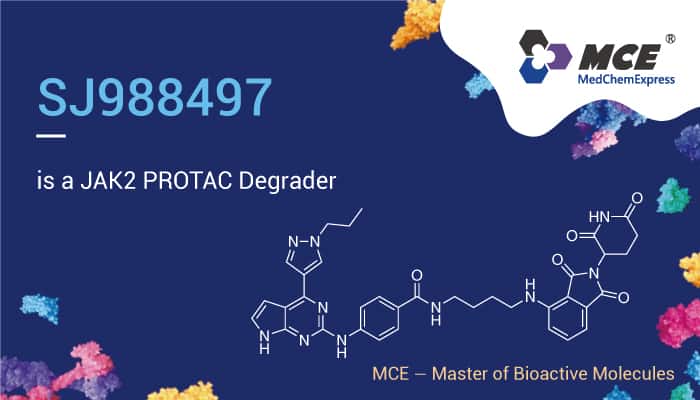CRLF2-rearranged (CRLF2r) acute lymphoblastic leukemia (ALL) is relevant with a poor outcome in children and adults. CRLF2r-ALL accounts for more than half of Philadelphia chromosome-like (Ph-like) ALL. Noticeably, the overexpression of CRLF2 activates JAK-STAT and parallel signaling pathways. However, small molecules inhibiting JAKs are variable and limited. Importantly, Using PROTACs is a promising method to selectively degrade JAKs. PROTACs can recruit E3 ubiquitin ligases (such as CRBN) for proteasomal degradation. Therefore, PROTACs possess good tissue distribution and the ability to target intracellular proteins. Here, we’ll introduce a PROTAC JAK2 degrader, SJ988497. It is a PROTAC JAK2 degrader consisting of a Ruxolitinib derivative, a linker, and a CRBN ligand (Pomalidomide).
SJ988497 is a PROTAC JAK2 degrader used for CRLF2r acute lymphoblastic leukemia (ALL).

SJ988497 is a cell permeable PROTAC JAK2 degrader. It has a high affinity for JAK2 (distribution coefficient: 0.3 nM). Moreover, It potently inhibits CRLF2r cell proliferation in a CRBN-dependent way.
In vitro, SJ988497 (72 h) inhibits parental MHH-CALL-4 cells with an EC50 of 0.4 nM and can be blocked by Lenalidomide (30 μM). Besides, SJ988497 (72 h) inhibits CRBN-KD MHH-CALL-4 cells with an EC50 of 3456.2 nM. The above results indicate that SJ988497 selectively kills ALL cells in a CRBN-dependent manner. As for the JAK degradation assay. SJ988497 (1 μM, 1 h) results in comparable JAK inhibition in MHH-CALL-4 cells.
As for in vivo, the researchers use xenograft mice inoculated by leukemic cells as an animal model. Results show that SJ988497 (30 mg/kg, i.p.) reduces spleen size and tumor burdens bone marrow, blood, and spleen. Similar to the results in vitro, SJ988497 (30 mg/kg, i.p.) also inhibits JAK2 and STAT5 phosphorylation and degrades JAK in vivo. And SJ988497 is well tolerated with no weight loss or perturbation in blood count.
Above all, SJ988497 is a cell-permeable PROTAC JAK2 degrader. SJ988497 shows anti-cancer activity and JAK2 degradation activity both in vitro and in vivo. SJ988497 can be used in the research of leukemia.
[1] Chang Y, et al. Blood. 2021 Dec 9;138(23):2313-2326.